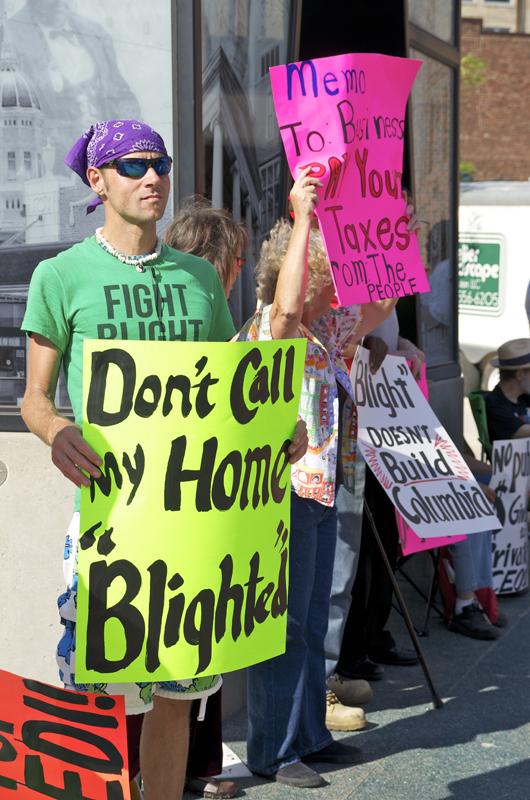
Enhanced enterprise zone (EEZ) protestors, holding signs reading “EEZcome? No, EEZgo!” gathered Wednesday to proclaim that City Council is making a mistake by including the tax incentives in Columbia.
“An EEZ … is an agreement with the state where businesses who are in an EEZ get tax breaks,” protest organizer Linda Green said.
An EEZ is a tax incentive for businesses that move into blight-designated areas. To qualify for an EEZ, the company must expand into those areas, invest a minimum amount and create two new jobs.
“To establish an EEZ, the whole area has to be designated as blighted (taking property for eminent domain),” Green said. “This is a bad designation for anybody who has property in a blight zone. It also reflects on the reputation of our city.”
Green said the city is saying the EEZ is a job program. They want to bring jobs to Columbia, but on the downside, they don’t have data to prove this system is successful, she said.
She also said the city thinks if it does not blight the area, businesses will pass them by and go somewhere else.
“We don’t have evidence that giving a tax break to a business really changes where they locate,” Green said. “Businesses decide where they are going with all sorts of factors that they find necessary for a successful business. Once they decide where they are going, they try to get a tax break from the city they are located in.”
The Maneater attempted to reach EEZ Board member John Strotbeck, but did not receive a response. The board was appointed by City Council to decide on whether to implement EEZ incentives or not.
The EEZ board should go to the City Council and report that they have no data to determine if EEZs should be used, Green said.
“EEZs do not really work to bring jobs to areas,” Nestor MacKno, a protestor at the rally said. “The net result is usually negligible, and what you end up doing is giving money to (big corporations).”
MacKno spoke about the new DoubleTree by Hilton hotel currently under construction on the site of the former Regency hotel.
“What (the city ends) up doing is giving money to Paris Hilton, who they gave nearly $3 million to, so they could build a new Hilton,” MacKno said. “Right, as if the Hiltons cannot afford their own hotel.”
To MacKno, solving the matter is as simple as convincing a handful of Council members that EEZs are not necessarily a way to bring jobs into the city.
“All we have to do is get four people to realize that it is not in the best interest of Columbia to give tax breaks to large corporations,” MacKno said.
Green had a different perspective on the difficulty of convincing these four council members.
“Anytime the people stand up and say what they want and what they think, I think the City Council needs to listen,” Green said. “I think they can be swayed, although I think it is very difficult. We have to try. This town should not be run by the profit motive.”
Green credited the protestors stand on EEZs to the author of “The Great American Job Scam,” Greg LeRoy.
“We talked to (LeRoy) in the library this past May. He concluded that businesses do not come to a city based on tax breaks,” she said.
Protestors complained that the investment in public corporations is wasting tax payers’ money. John Fry, another of the protesters, talked about the ripple effect businesses have on the city’s schooling system.
“We need our art teachers and our music teachers,” Fry said. “The businesses don’t step up to any of this. They don’t care about the cultural qualities of a city or region and whether it can continue its basic, positive aspects. We get more educational goals accomplished when we have music and art programs in schools.”